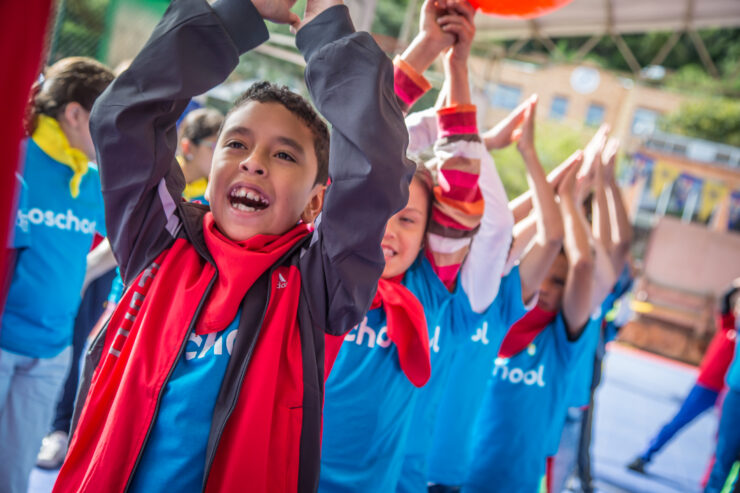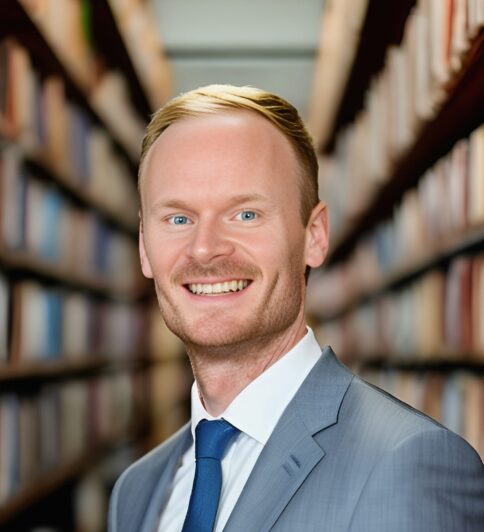Making social-emotional learning part of every classroom
Educators in Colombia nurture their students’ social and emotional wellbeing

Henry May of Coschool envisions a future in which social and emotional skill development and nurturing each child’s unique capabilities are integral parts of education. Henry talks with Aisha Schnellmann about how supporting educators in Colombia to improve their students’ social-emotional skills enables children to thrive.
Aisha Schnellmann: What are the biggest challenges facing children globally as well as in Latin America?
Henry May: Children worldwide, and particularly in the areas where we at Coschool work, continue to face significant challenges because of a lack of quality education across different stages of their development. Early childhood education, especially for ages 0 to 5, is crucial in shaping children’s futures. Yet despite progress over the past 15 to 20 years, there’s still a long way to go to make sure that young children receive the support they need from qualified, caring adults who can nurture both their learning and their emotional wellbeing.
Another key barrier globally is literacy. Without it, children struggle to engage in school – they’re unable to read, comprehend, and participate fully. Equally essential are social-emotional skills, such as self-regulation, self-respect, and the ability to engage in respectful relationships, which help children navigate school and build resilience for life.
And there are children growing up in environments marked by violence and trauma, who often bear lasting emotional scars. Those who are especially vulnerable – including children in countries dealing with economic hardship, unemployment, and inadequate nutrition – are affected even more profoundly. In Latin America, for example, education is often unable to help children escape poverty and fails to meet children’s emotional needs, owing to high levels of inequality and under-resourced public schools.
AS: What do children need to help them thrive?
HM: Children need adults who are caring and supportive, while still holding high expectations. They benefit from adults who act as positive forces in their lives, offering guidance, experience, and tools to help them grow.
Children need friendships and healthy relationships with their peers. Diverse opportunities are also essential, including opportunities to explore new environments, spend time in nature, and step out of their comfort zones.
In addition, it is crucial for children to develop self-management skills, including the ability to regulate their emotions, make sound decisions, and build courage – skills that can be taught over time.
“Children need adults who are caring and supportive, while still holding high expectations.”
AS: How is Coschool helping children’s learning and development in Colombia?
HM: At Coschool, we believe that teachers can significantly change a child’s life, especially when children lack supportive adults at home. That’s why training and upskilling teachers is a key focus for us. Teachers who are motivated, are equipped with strong skills, and maintain good mental health can better support their students’ growth.
Because teachers have such profound influence, we also prioritize working with school leaders. A single school leader can positively impact many teachers, and each teacher can affect countless students. In our programme PRIMED, we collaborate with school leadership teams as they focus on helping students thrive through social-emotional learning and character education. We train both school leaders and teachers, showing them how they can intentionally implement the relevant principles in their classrooms.
“Teachers can significantly change a child’s life, especially when children lack supportive adults at home.”
AS: What have you learned and what has inspired you in this work?
HM: I’ve learned that adults are shaped by their own childhood and life experiences. The responsibility for children’s growth lies with adults, and unless those adults have a certain level of self-awareness, meaningful change in education is difficult. The most impactful teachers and educators are those who continually work on their self-awareness, learning and discovering more about themselves along the way. Some head teachers have experienced childhood trauma, for example, and when that trauma remains unaddressed, it can affect their leadership and have an impact on their team, teachers, and, eventually, students.
I am inspired by the growing recognition and understanding of the importance of social-emotional learning and character education. We have established a national partnership on social and emotional learning in Colombia (AFSEC), with more than 60 active member organizations. Discovering so many dedicated allies and partners committed to this work has been both inspiring and encouraging.
AS: What is your vision for children in the future?
HM: My vision for children is a future in which social and emotional skill development and nurturing each child’s unique capabilities are natural components of education – making organizations like Coschool no longer necessary. I envision children growing up in safe, supportive environments with the freedom and resources to fully explore and expand their potential. I’d love to see children become individuals and community members who genuinely care for one another, fostering a society that values collective wellbeing and personal growth.
Footnotes
Henry May is the CEO of Coschool, one of Colombia’s leading organizations for social and emotional learning, and a distinguished social entrepreneur and educator. As the founder of Coschool and the Huracan Foundation, he has made a difference in over 55,000 lives across 30 countries through his work. A TedX speaker, Henry was named a “Global Meaningful Business Leader 2021” and has been recognized for bridging the gap between public and private schools. Coschool, under his leadership, has gained global acclaim for educational innovation. Henry resides in Bogotá, where he enjoys ultramarathon running in his spare time.
Coschool website, and on Facebook, X, Instagram, and LinkedIn
Coschool is a finalist for the 2024 Klaus J. Jacobs Best Practice Prizes, which recognize institutions and individuals working to implement evidence-based solutions aimed at promoting child development and learning in practice.
This interview has been edited for clarity.

